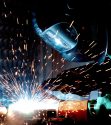Career Profile: Precision Metal Fabricator

If you look around any building, you can see many metal objects. Door handles, cabinet handles, car parts, and even picture frames can be made of metal. People who work as precision metal fabricators help to make these metal parts. If you are comfortable working with machines and enjoy making things with your hands, you should consider this field.
Working as a precision metal fabricator involves cutting and shaping metal. Being able to read and use blueprints and to make mathematical calculations is essential for the work. Welding, cutting, and operating a forklift are part of the job. Working with sharp metals and cutting or welding machines can be dangerous, and a knowledge of emergency First Aid is very useful, and necessary in this job.
Often, people in this trade work indoors in factories or manufacturing plants, but they can also work on construction sites and even for private clients. Wages start at just under $17 an hour or about $29,000 a year and can rise to almost $33 per hour or $65,000 a year. Normally, the work is full time, but it can depend on the strength of the economy and how many people are looking for new houses or metal cabinets or other objects containing metal.
Becoming a precision metal fabricator involves completing an apprenticeship of 7280 hours of on-the-job training and three sessions of in-class training that are each eight weeks long. Certification is voluntary, and people with work experience can apply for a Trade Equivalency Assessment. Experience is always very important in the trades, and if you have a friend or relative who can show you how the work is done, that could help you get a good start. In school, taking mathematics or shop classes could help you learn some of the skills you need.
Being good with your hands is essential to working as a precision metal fabricator. Patience and the ability to work through problems and to follow instructions are important. Taking English classes to learn to read and write complicated documents can be helpful. Many precision metal fabricators work with other people, but sometimes they work on their own and should be able to deal with accounting and helping customers.
Depending on where they work, precision metal fabricators might have to deal with very different conditions. The hours can be long in the middle of projects, but the job can be very quiet at certain times of the year, especially for anyone involved in construction. In areas of the country with cold winters, precision metal fabricators might want to find other work during the cold season, such as working as a boilermaker or pipefitter, since these jobs require many of the same skills. Cuts, burns, and other injuries are common in this trade, and people should prepare to take time off work to recover if necessary.
Working as a precision metal fabricator can be an interesting and rewarding job for people who enjoy working with their hands, often on small details. If this describes you, this career might be a good choice.
Bibliography:
British Columbia Institute of Technology. “Metal Fabrication.” https://www.bcit.ca/study/programs/metalfabrication.
Neuvoo. “Metal Fabricator Salary.” https://neuvoo.ca/salary/?job=Metal%20Fabricator.
Ontario Youth Apprenticeship Program. “Precision Metal Fabricator.” https://oyap.com/trades/?fuseaction=Profile&appnum=087
Payscale. “Metal Fabricator Hourly Rate.” https://www.payscale.com/research/CA/Job=Metal_Fabricator/Hourly_Rate.





Leave a comment!